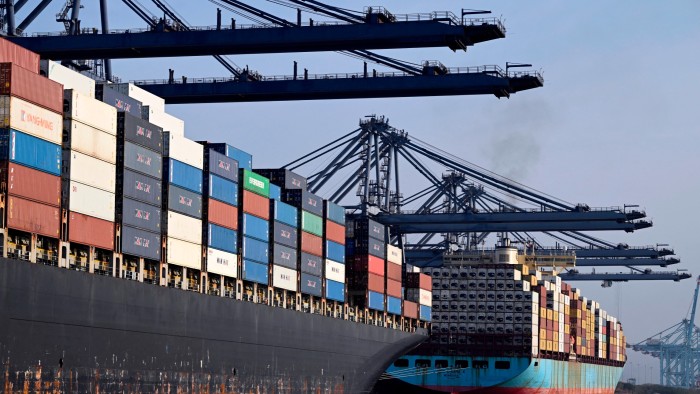Unlock the Editor’s Digest for free
Roula Khalaf, Editor of the FT, selects her favourite stories in this weekly newsletter.
It would take US President Donald Trump “a decade or two of persistent effort” to redraw global supply chains using tariffs, the boss of the world’s second-largest container shipping group has warned.
Vincent Clerc, chief executive of AP Møller Maersk, told the Financial Times that trade volumes between the US and China had dropped 30-40 per cent in April as a result of Trump’s swingeing tariffs but that other routes, such as between Asia and other emerging markets, had remained strong.
“The supply chain today around the world is something that has been built over decades. If you want to upend it or change it in a deep way it will take decades,” he said. “It takes time for companies to make decisions, for factories to be built. It’s very unrealistic for supply chains to be changed very quickly due to tariffs.”
Maersk is a bellwether for global trade, transporting one in five containers across the sea and its views on supply chains are closely watched.
The Danish group warned on Thursday that global trade could contract this year, scaling back its previous forecast for growth in container demand of about 4 per cent to as low as minus 1 per cent.
“It is bumpy today. But so far it’s mostly affecting China-US relations and volumes,” Clerc said.
He added that China-US trade represented about 5 per cent of Maersk’s volumes so the drop so far was about 2 per cent of its total. “We’ve responded by moving almost 20 per cent of our capacity on China-US to other routes, especially the Far East to other emerging markets. It’s proven to be good,” he said.
Maersk’s chief executive said the bigger threat could be the knock-on impact of tariffs on the economy. “If things become entrenched, inflation keeps increasing and we see a risk of recession in the US, then volumes will suffer in the second half. Our role at Maersk is to support our customers through this ordeal,” Clerc added.
Trump has expressed a repeated desire for US companies to bring their manufacturing back home and for foreign groups to have more American production.
But Clerc was sceptical, arguing that the US lacked labour. “There is no production of snowboard boots outside China. If you want to change that, it will take time — or you need to stop snowboarding. I would not overestimate the weight the US has with regards to global trade,” he added.
Talks between US and Chinese officials, as well as the planned signing of a US-UK trade deal on Thursday, were “good signs” of potential de-escalation, Maersk’s chief executive said.
His comments came as Maersk reported first-quarter results ahead of analysts’ expectations and it maintained its full-year guidance.
Revenues increased by 8 per cent to $13.3bn, and operating profit jumped more than seven-fold to $1.2bn. Maersk expects to make an underlying operating profit of zero to $3bn this year.


